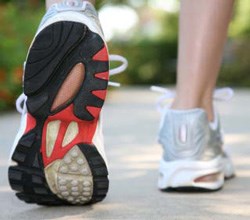
Top stories






More news














A new brochure from the University of Colorado Cancer Centre, recently published in the Clinical Journal of Oncology Nursing and endorsed by the American College of Sports Medicine, makes planning and monitoring post-cancer exercise easy.
"Our program is geared toward small steps, reaching goals, and then modifying them as needed," says Catherine Jankowski, PhD, investigator at the CU Cancer Centre and assistant research professor of geriatric medicine at the University of Colorado School of Medicine. "You have cancer survivors who overestimate or underestimate their abilities, or fear returning to exercise. For some people who weren't exercising before, cancer can even be their wake-up call."
"This is a valuable link between the clinic and home," says Ellyn Matthews, PhD, RN, assistant professor in the CU College of Nursing and co-author of the exercise brochure. "It's been that at the end of treatment, cancer patients are told to exercise but left completely on their own, and we've seen that this can lead to a dangerous lack of exercise. Our materials try to get cancer patients to ask 'what can I do myself to improve my quality of life through exercise?'"
The program guides cancer survivors through the process of picking an exercise, setting short- and long-term goals, monitoring progress, and revising goals as needed. Importantly, the brochure helps the diverse population of cancer survivors personalise their exercise goals to maximise well-being across psychological and physical health. Cancer survivors can download the brochure for their personal use or physicians can include the brochure in patients' paperwork.
Jankowski and Matthews point out that a major challenge for cancer survivors is the idea that exercise will add even more fatigue on top of the debilitating tiredness that can accompany cancer treatment. In fact, they say, the reverse is true: In cancer patients like the population at large, exercise decreases feelings of fatigue.
"Actually our exercise recommendations for cancer survivors aren't that much different than recommendations for healthy Americans, but getting to that level of activity might take cancer survivors a little longer and require additional support," Jankowski says.
Downloading or distributing Jankowski and Matthew's brochure is a good first step.